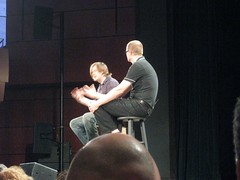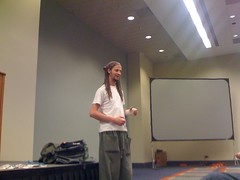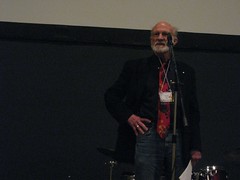New readers -please note there is a context here, especially wit h Pete. He uses a lot of paradox, irony, and hyperbole. But he also uses humor, hence the segue entrance.
h Pete. He uses a lot of paradox, irony, and hyperbole. But he also uses humor, hence the segue entrance.
After he successfully dismounted, he gave these words prior to the real introduction of his message: “My job is to get you to disagree with me. I don’t even agree with meYou need to push back against what I am saying. To cause a rupture ….”
Peter Rollins – For Those With Ears to Hear: Parables and the Lost Art of Provocation – an exploration of that theological dis-course that holds the power to send us hurtling off course and onto a new one
We need Substantial Change
Christianity is fundamentally violent – People like St. Theresa ruptured the system (Ghandi, MLK)
The question isn’t whether Christianity is true but what does Christianity claim when it claims to be true?
The desire to know the name of God -Moses – systematic theology – gives us insight to who we are now
People’s dogs looks like their owners – people’s gods also look like them
– in baptism, we are brought into the name of God
Revelation is –
epistemological incomprehension
experimental bedazzlement – experience you can’t experience
transformation – no longer the same again
God is apocalyptic – the incoming of something you cannot predict
He reveals and conceals at the same time.
It is darkness and light – hidden/revealed – mystery/revelation
we are changed/renewed
You are my strength (my maranatha) but I am weak.
I fired it up, hallelujah, hallelujah, hallelujah
I curse the day when I saw the light, when you found me.
I find my home in Babylon, where I am exiled.
Why don’t worship songs express our darkness, only love and hope?
So our preaching should be a discourse.
a course that take you off-course
Theo-poetry
something to disturb, alter, change
disruptive, subversive & grounded
Sermons are always about the here and now.
always on the practical
I deny the Resurrection every time when I fail the poor, when I do not serve the helpless
I affirm the Resurrection every time I stand up for those that cannot stand for themselves.
This is substantial change.
 If I can’t use any biblical language, how would I describe this? to a child? to a Martian? without words? using only drawings and pictures? using only actors? in thirty seconds?
If I can’t use any biblical language, how would I describe this? to a child? to a Martian? without words? using only drawings and pictures? using only actors? in thirty seconds?
 You can read be a bit about
You can read be a bit about 









 Some practices to consider:
Some practices to consider: While I cannot honestly say that DCLA is cheese-free (sorry Lost & Found), at least it’s focused on its mission. I do not claim to know the behind the scenes decisions, nor do I know specifics and I would only guess the names but from where I sit, it seems that after YS took over, the event underwent quite the paradigm shift. This year’s theme was “Be, Love, Serve, Repeat”. Perfect for our group. There were no bigger than CCM-life bands but it was cool that Family Force 5, Hawk Nelson, KJ-52 were there. All of us had a good time, we laughed, we were entertained and at times overloaded by it all but what I loved is that the focus on loving Christ and others was central. If you didn’t see it, you were daydreaming about Toby Mac and Mac Powell flying down from the rafters.
While I cannot honestly say that DCLA is cheese-free (sorry Lost & Found), at least it’s focused on its mission. I do not claim to know the behind the scenes decisions, nor do I know specifics and I would only guess the names but from where I sit, it seems that after YS took over, the event underwent quite the paradigm shift. This year’s theme was “Be, Love, Serve, Repeat”. Perfect for our group. There were no bigger than CCM-life bands but it was cool that Family Force 5, Hawk Nelson, KJ-52 were there. All of us had a good time, we laughed, we were entertained and at times overloaded by it all but what I loved is that the focus on loving Christ and others was central. If you didn’t see it, you were daydreaming about Toby Mac and Mac Powell flying down from the rafters. Shane Claiborne – we were debating whether to change our youth group name to the Shane Fan Club but another group already did that. They grew out their hair, had dreds, made their own clothes and ran their cell phones off of solar power. We were willing to do that and convert the church music room into a homeless shelter but we lost our momentum over the lifelong celibacy vow. In seriousness, judging from the low attendance at Shane’s seminars, he’s not the superstar to this age group as he is to X’ers and older Millennials but by Monday, everyone knew who he was. (Ours did of course, because Claiborne worshippers like
Shane Claiborne – we were debating whether to change our youth group name to the Shane Fan Club but another group already did that. They grew out their hair, had dreds, made their own clothes and ran their cell phones off of solar power. We were willing to do that and convert the church music room into a homeless shelter but we lost our momentum over the lifelong celibacy vow. In seriousness, judging from the low attendance at Shane’s seminars, he’s not the superstar to this age group as he is to X’ers and older Millennials but by Monday, everyone knew who he was. (Ours did of course, because Claiborne worshippers like  – Kendall Payne – I’m pretty sure she’s not signed to a label but a true indie artist. I admit I almost missed the boat on Kendall. She had released some kind of anti skinny model looking girls song that encouraged girls to appreciate themselves for who they were and to pursue a healthy sense of identity but she probably didn’t hear how it sounded with a bunch of 14 year old girls singing it in the church van (a moment from a few years ago that resulted in Bose, noise-cancelling headphones to all youth leaders). The rest of her work is brilliant (like Scratch and I personally like the Grown album.) I usually don’t like to talk about the cover songs of talented artists but she did two that are worth mentioning. One was “What if God Was One of Us?” which was pretty controversial back recorded by Joan Osborne back in 1995. It seemed to me that too many of us Christians perceived it as an attack on God’s deity but instead, it said and asked a lot more. She also did a cover of U2’s “One”. It was smooth and slow and I hope one day a youtube clip of it appears. As a fan of U2 (Sept 26 at Giants Stadium can’t come
– Kendall Payne – I’m pretty sure she’s not signed to a label but a true indie artist. I admit I almost missed the boat on Kendall. She had released some kind of anti skinny model looking girls song that encouraged girls to appreciate themselves for who they were and to pursue a healthy sense of identity but she probably didn’t hear how it sounded with a bunch of 14 year old girls singing it in the church van (a moment from a few years ago that resulted in Bose, noise-cancelling headphones to all youth leaders). The rest of her work is brilliant (like Scratch and I personally like the Grown album.) I usually don’t like to talk about the cover songs of talented artists but she did two that are worth mentioning. One was “What if God Was One of Us?” which was pretty controversial back recorded by Joan Osborne back in 1995. It seemed to me that too many of us Christians perceived it as an attack on God’s deity but instead, it said and asked a lot more. She also did a cover of U2’s “One”. It was smooth and slow and I hope one day a youtube clip of it appears. As a fan of U2 (Sept 26 at Giants Stadium can’t come  fast enough!), this song is so overdone, but Kendall did a fantastic job.
fast enough!), this song is so overdone, but Kendall did a fantastic job. – … the focus on our worship wasn’t on Starfield’s lead singer so much. With access to multiple camera angles, a million different types of backgrounds, a million more that motion backgrounds and the idea of flat worship, Tim’s face was on the big screen way too much and it got distracting. I know that is not Tim’s, Starfield’s or YS’s intention but it seemed considerably more than at NYW Conferences. This isn’t a criticism of Starfield, I like them but just the way we did worship seemed too focused on them. I didn’t mention this until one of our students brought it up. It led to a great conversation regarding worship.
– … the focus on our worship wasn’t on Starfield’s lead singer so much. With access to multiple camera angles, a million different types of backgrounds, a million more that motion backgrounds and the idea of flat worship, Tim’s face was on the big screen way too much and it got distracting. I know that is not Tim’s, Starfield’s or YS’s intention but it seemed considerably more than at NYW Conferences. This isn’t a criticism of Starfield, I like them but just the way we did worship seemed too focused on them. I didn’t mention this until one of our students brought it up. It led to a great conversation regarding worship. Q Conference, I understand that they want you to be here and be conscious of those who are gathered with you. I’ll respect it but when I put on my own conference, “Posers, Players, and Punks”, I’ll let whoever do whatever they want. Anyway, they say that they will release video of this one day but in the meantime you’ll have to deal with my subjectivity until you’re able to have your own:
Q Conference, I understand that they want you to be here and be conscious of those who are gathered with you. I’ll respect it but when I put on my own conference, “Posers, Players, and Punks”, I’ll let whoever do whatever they want. Anyway, they say that they will release video of this one day but in the meantime you’ll have to deal with my subjectivity until you’re able to have your own: For some it is to be evaluated, “Did you like it?”, “Did they do a good job?” As the preacher, you want to interrupt one of these conversations and say, “How did you do?”
For some it is to be evaluated, “Did you like it?”, “Did they do a good job?” As the preacher, you want to interrupt one of these conversations and say, “How did you do?” The picture to the right is a quote of collected words of advice to every pastor. It was something like – “The preacher should be honest and transparent. He should use the Bible but not too much but it should be practical and it should be funny too but not too funny because you’re a pastor not a comedian but you should tell lots of stories but not too many because that gets old too. You should use personal illustrations like about your family but try to be creepy about it, and you should admit your faults but not too many because that’s depressing but you really should be open and honest …”
The picture to the right is a quote of collected words of advice to every pastor. It was something like – “The preacher should be honest and transparent. He should use the Bible but not too much but it should be practical and it should be funny too but not too funny because you’re a pastor not a comedian but you should tell lots of stories but not too many because that gets old too. You should use personal illustrations like about your family but try to be creepy about it, and you should admit your faults but not too many because that’s depressing but you really should be open and honest …”



 The strength of
The strength of




Recent Comments